President Obama’s ostensible line of reasoning in negotiating a historic normalization of official relations with Cuba is that more exposure to outsiders and outside ideas (and outside money) will make Cuba more amenable to civil-society and economic reforms. The good news is that since the December announcement of the countries’ agreement, there has already been some apparent progress, as Reuters’ headline announces:

Screen shot/Reuters
The bad news is that when you read the article you find out that “arbitrarily detaining fewer dissidents” in Cuba still means detaining 178 dissidents in January alone for periods ranging from two hours to 12 days, according to the Cuban Commission of Human Rights and National Reconciliation.
Most of the detentions in January were a response to the activism of recognized dissidents, some of whom were harassed on their way to attending church, the commission said. Three were held for handing out political pamphlets, the commission said.
Still, that’s better than the monthly average of 741 political detainees per month in 2014. As the saying goes, “a journey of a thousand miles [toward eliminating the arbitrary detention of dissidents] begins with a single step.”
